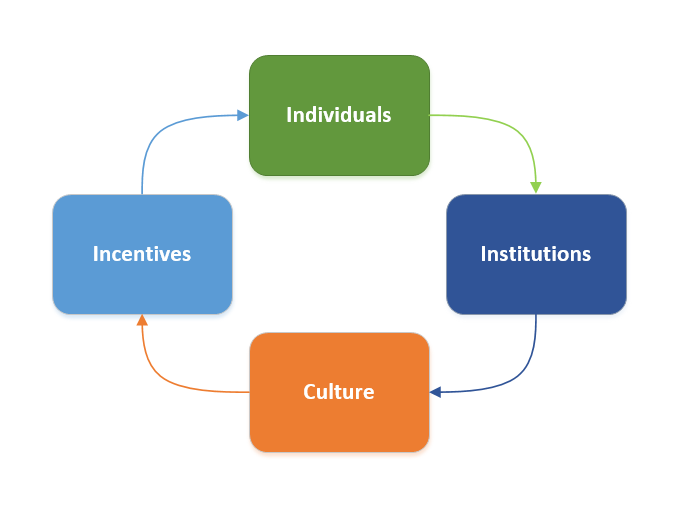The Modern Survival Guide #87
 This is misleading, but it?s surprisingly hard to get a good image for ?culture?
This is misleading, but it?s surprisingly hard to get a good image for ?culture?
This is the Modern Survival Guide, a guidebook I?m writing for things I think people need to know about living in the modern world. The views expressed here are mine, and mine alone. And I am fascinated with the way our world works ? it?s why I?m writing this series as a whole. More to the point, I have particular ideas on why the world works the way it does, and this article is part 3 of a mini-series on the topic of understanding society. Previously we discussed the importance of individuals and institutions; today we?re talking about culture.
Culture is important because it creates assumptions about how the world operates, and those assumptions in turn drive a huge piece of our behavior. The rest of this article will focus on how that works, so let?s start with a definition:
Culture: The customs, achievements, patterns of behavior, and social assumptions of a particular nation, people, or social group.
In the last couple of articles I?ve been using a prop to talk about the broader implications of these topics, and here it is again:
 Society, in a nutshell
Society, in a nutshell
I?ve been referring to this diagram as the Society Wheel because, well, it?s how I think we get ?society,? and it?s a looped, iterative process. I?m not saying that the arrows always point in these directions, but I think this is how things normally work.
Back to culture: culture occupies the third place on the wheel, and for good reason ? it?s dependent on the prior interactions of individuals with institutions to create it. Culture does not emerge spontaneously from a vacuum, and there are very real, very clear actions that create it. On the other side of the box, I think culture is responsible for most of the incentives in society, which is super important. Let?s dive in.
How Culture is Made
To recap the prior articles: based on incentives they receive, individuals create or work within institutions in order to accomplish major goals. Institutions establish practices, customs, and organizations as a means of accomplishing their goals, and then protect and perpetuate these things.
Practices, customs, and organizations outright determine the shape of our culture, in all kinds of ways, but the basic argument is that these things create what we think of as ?reality? ? they set up the ways in which the world works. Our ideas of ?reality? create what we think of as ?culture,? almost by definition; our patterns of behavior and social assumptions are dependent on the ?reality? that is created by our institutional framework.
Take the tipping culture, for example. In America, it?s common to tip service staff (but only in some industries), and the tip has increasingly come to be the majority of the pay of those staff. We don?t even think about it, beyond employing esoteric calculus to figure out group tip percentages. That has major implications for our personal finances, and also for how we treat restaurant workers and service personnel as the customer.
Tipping culture is reinforced by the various restaurant and service industry institutions. It?s embedded in their accounting practices, their hiring assumptions, their management style. It features in our laws. It?s accepted by the population, and it?s weird for an American to be in a restaurant and not tip. On the other hand, it?s weird for many non-Americans to come to the US and find out that they need to budget an extra 15% for every meal. It?s a major cultural difference between different areas.
This is just one example, but it shows how our ?culture? is nothing more and nothing less than the way in which we expect the world, or at least our piece of it, to operate. It?s as broad as the national fascination with Beyonce, as small-scale as how to flush a toilet, as intrusive as what brand of condom we buy, and as pervasive as fashion. It?s everything that makes us ?us,? and not some other group of people. Institutions make it, perpetuate it, and defend it.
Now here?s the tricky bit: culture is being made all the time. It?s in constant flux as people make institutional changes that alter some part of how we expect the world to work. It?s not easy to make those changes, but once they?re made they tend to have truly massive ripple effects. This is how we can go from a racist, homophobic, religious monoculture nation to a less racist, less homophobic, less monocultural religious landscape in the space of half a century or so. People took action to change the institutions that upheld the culture of the time, and in the process created the present culture.
The Importance of Culture
Culture is important because it creates the world in which we think we live. Note the emphasis. The world in which we think we live forces us into particular patterns of behavior and provides certain acknowledged incentives to us. We don?t have to live in that world; that?s the whole point of countercultural movements. But the dominant culture is the default option, and most people, most of the time, will never give much thought to other options.
Think about all the things in your life that you do and think because it?s what?s done. You put up your hand in class when you ask questions. You put on pants before you go outside. You wear nice clothes to show status. You get a job because you need money. You think money has value. You get married to show commitment. You value college because it implies education. You talk about entertainment shows you watch with your friends (but only some entertainment shows, if you catch my drift). You think a church requires four walls and a cross somewhere. You think a paved road requires asphalt or concrete.
That?s not even scratching the surface. Culture is such a broad topic because it?s everything that we take for granted, that we just assume is happening, or relevant, or true. That?s why culture shock is so disconcerting ? we rely on ?normal? to get us through most of our days, and it?s unsettling when we don?t know what ?normal? is. It?s also why counter-culture movements usually fizzle out or are absorbed into the dominant culture. The counter-culture either wins or is destroyed. Nobody wants to feel weird forever, and dominant cultures tend to impose penalties on people who don?t conform.
And that takes us to the crux of the issue: culture is important because it provides the baseline incentive structures in a society that create situations where people want or feel obligated to do certain things.
Culture Creates Incentive Structures
Let?s talk about incentives ? an incentive is anything that motivates or encourages you to do something. Incentives surround us every day, in huge webs of obligation and need-fulfillment, and most of them we never even think about.
I?m hungry, so I need food. I need money to get food, so I get a job. I have to maintain my job to keep getting money, so I have a reason to be good at it. None of this makes sense if my culture isn?t set up such that jobs are how I get money, and such that I have to use money to buy food.
I?m horny, so I try to find a sexual partner. I?m missing intimacy, so I look for a romantic partner. My community tells me that in order to confirm my pledge of intimacy and have a legitimate sexual partnership, I should get married, so I get married. This doesn?t make sense if the concept of ?marriage? isn?t ingrained in the culture. It doesn?t make sense if we don?t conflate the ideas of romance and sex.
I?m bored, so I turn on the TV. I pay money to the cable company so that I have something to watch. The cable company takes my money and rents space to advertisers to make their profit. The entertainment shows compete for the highest viewing audience to get the most money from advertisers and the cable company to make their profit. None of this makes sense if the culture isn?t set up around the concept of television entertainment, or if we?re not relying on the profit motive in capitalist business.
I desire to walk down the street without getting mugged. So I vote for politicians and policies that create and nurture police departments. The police department becomes corrupt, wasting my money and abusing their position, which increases the chaos they were supposed to suppress. So I vote for politicians and policies to reform the police. None of this makes sense if the culture isn?t set up to expect government to provide safety.
And so on, and so forth, for everything.
Incentives emerge from a variety of sources, but the incentive structure ? the way the incentive is resolved ? is almost always a product of culture. To return to a prior example, the concepts around food are fascinating. Of course we have to eat; that?s not a cultural product, but a biological fact. We are therefore incentivized to seek food. However the way in which we eat is cultural, and what it takes for us to eat is cultural. ?I?m hungry, therefore I eat food,? isn?t actually an incentive structure. ?I?m hungry, therefore I earn money to buy food (or money to buy the things I need to plant, forage, or hunt food),? is an incentive structure.
I have to earn money because my culture doesn?t support the idea of just giving people food if they can do something productive to earn it. This is the product of a long, complex cultural transformation away from sustenance lifestyles, away from barter systems, and towards the use of systematized and monitored productivity analogue transfers (also known as ?money?). It?s also a product of a long cultural discussion about what qualifies as ?productive,? and what qualifies as the ability to be productive.
Let?s break it down into some common principles. All incentive structures are dependent on a few factors:
- Culture creates ?normal?
- ?Normal? provides a list of options
- Culture creates assumptions
- Assumptions determine which of the options we pick
- Incentive structures therefore feature choices that follow ?normal? options through assumptions to show how a need turns into a resolution
We?ll discuss this in more depth in the next article, but for now just look at how this plays out in our prior examples. Note the perceived options. Note the assumptions being made. Note the flow of choice. All of those are cultural artifacts; all of those are created by the Wheel turning and grinding out change.?
None of this is simple, and it?s a shame we don?t spend more time on it in the average person?s education; anthropology is a singularly unfairly maligned and underfunded discipline.
Takeaway: Culture is Pervasive, Insidious, and Important
If you take nothing else away from this article, these are the three things to remember:
- Culture is pervasive: it?s a natural output of putting lots of people in the same place, and you?re not ever getting away from it. If you move somewhere else, you?ll just create a new culture.
- Culture is insidious: it provides direction for every action, in some cases forces direction on you, often without your conscious knowledge.
- Culture is important: you can?t change the world without changing the culture; if you try, the culture will just roll you over, render you irrelevant, and drive you into conformity. If you want to change the world, look to the Wheel to incentivize people to change institutions to change the culture to change the incentives to change the individuals to change the institutions? and round and round we go.
We?re about halfway through this little mini-series now. In the next three articles I?ll finish up a discussion on incentives, then start tying up the loose ends with a discussion of historical imperatives, and finish with a condensed explanation of why things are the way they are. See you then!
Look, I did warn you at the start of all this to grab an energy drink.
The late, great Terry Pratchett wrote many, many novels in the Discworld series exploring this theme, and if you have the time I would encourage anyone of any age to read them.
I am not at all ripping the idea of monogamous marriage, however. I love my wife very much, and I don?t want to be with anyone else. Monogamy works quite well for me, thank you very much.
Alternately, this could be ?I?m hungry, therefore I go and make the tools I need to get food.? And yes, you could very well go off in the woods and survive on your own, with nothing but your own two hands and exploratory spirit. It?s possible, it?s been done. But if you?re in England in the 1700s, you?d better not shoot the King?s Deer while you?re doing it. Culture always creeps back in, because societies tend to lay claim to every scrap of territory and resources that they can.
?And no, I?m not saying that every single incentive out there has to fall on the Wheel, and I?m not saying that culture creates every single incentive that there is. But I am saying that the incentives that emerge from and affect our societies do fall on the Wheel and are created by our cultures. There, now I?m covered from both angles.


